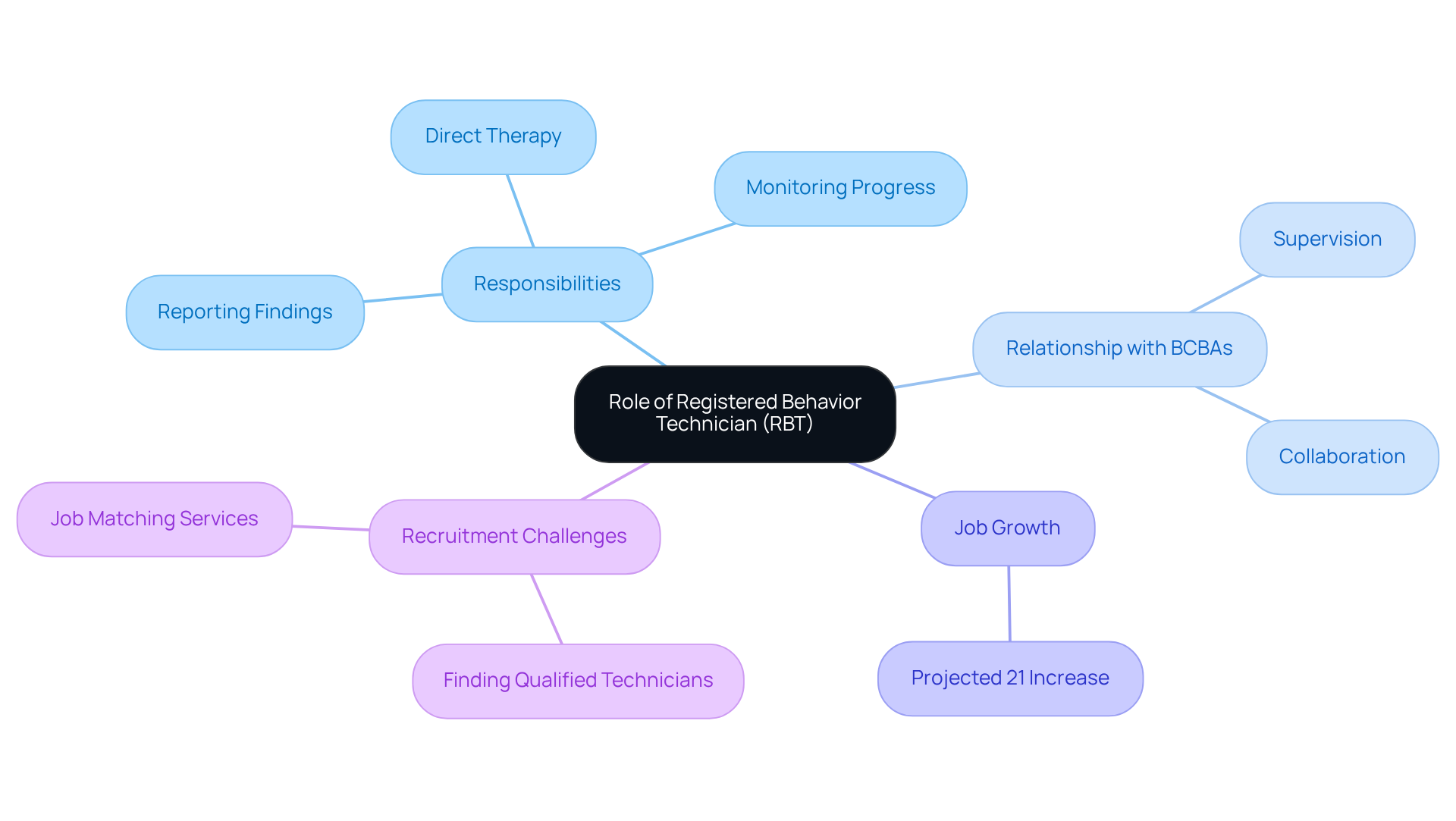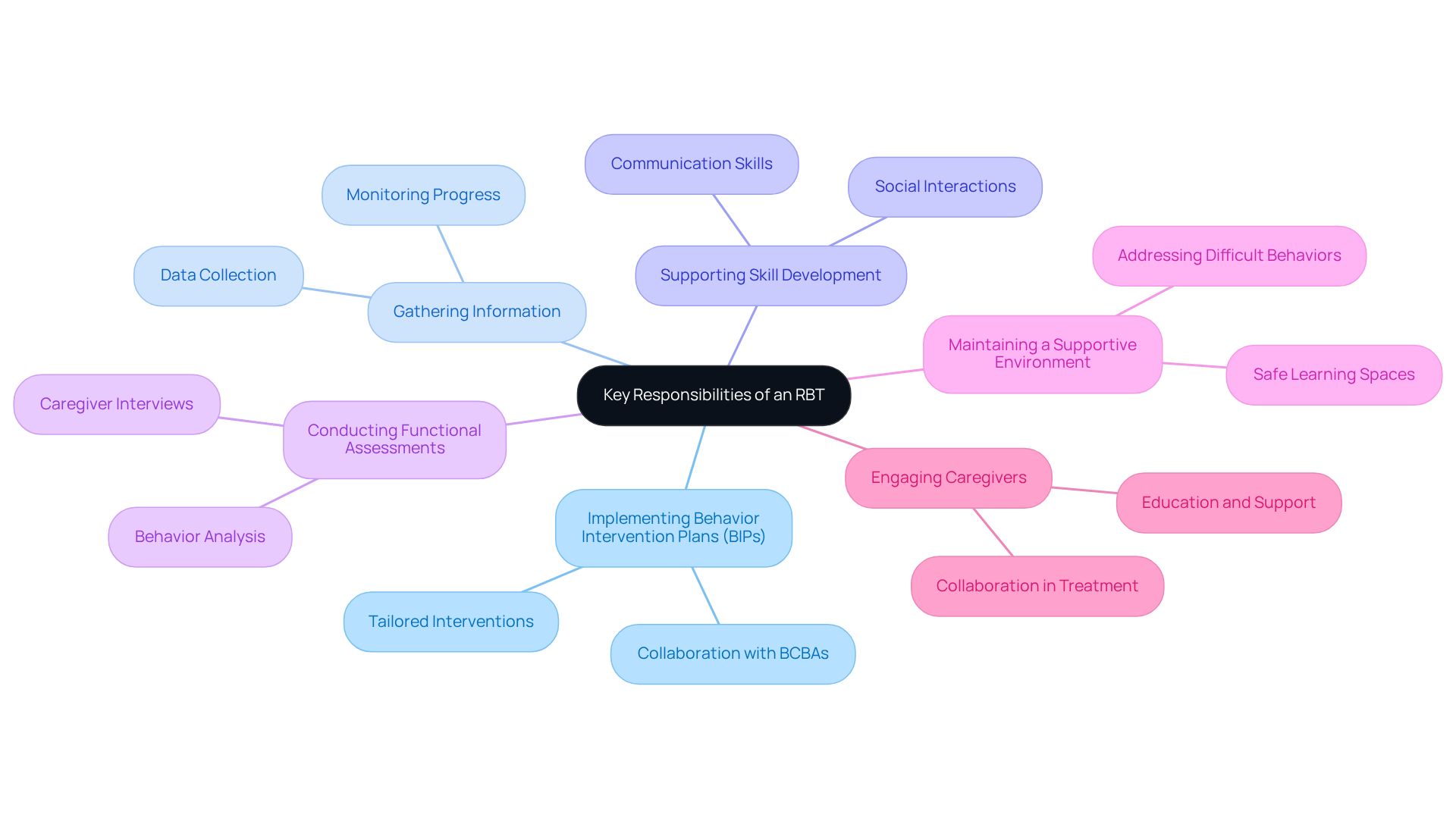September 2, 2025

A pivotal responsibility of a Registered Behavior Technician (RBT) in ABA therapy is the implementation of individualized Behavior Intervention Plans (BIPs), which are meticulously designed by their supervising Board Certified Behavior Analysts (BCBAs). This role is not merely supportive; it is essential. RBTs translate theoretical strategies into practical interventions, thus directly influencing the effectiveness of therapy and fostering positive behavioral changes in clients. The expertise of RBTs is crucial in bridging the gap between research and real-world application, ensuring that clients receive the highest quality of care.
The role of a Registered Behavior Technician (RBT) is pivotal in the landscape of Applied Behavior Analysis (ABA) therapy, particularly as the demand for these professionals continues to rise. RBTs are not merely assistants; they are key players in implementing behavior intervention plans and fostering skill development among individuals with Autism Spectrum Disorder and other developmental challenges.
However, the question remains: what is the most critical responsibility of an RBT that ensures the success of therapeutic interventions? This exploration delves into the essential functions of RBTs, highlighting their impact on treatment outcomes and the ongoing challenges they face in delivering effective care.
A Registered Behavior Technician (RBT) is a trained paraprofessional specializing in Applied Behavior Analysis (ABA), working under the supervision of Board Certified Behavior Analysts (BCBAs). Behavior technicians play a crucial role in providing direct therapy to individuals, particularly those with Autism Spectrum Disorder (ASD) and other developmental disabilities. Implementing behavior-analytic services, monitoring client progress, and reporting findings to their supervising BCBA for necessary adjustments to treatment plans are examples of what is one of your responsibilities as an RBT. This hands-on approach is essential for translating ABA theory into effective interventions that foster positive behavioral changes.
As the demand for registered behavior technicians continues to surge, the Bureau of Labor Statistics projects a remarkable 21% job growth rate for behavioral therapists through 2028. This trend underscores the necessity for these professionals to seek that align with their skills and preferences. Hire ABA offers tailored job matching services, employing advanced job fit scoring to connect behavior technicians with positions that align with their qualifications and preferred locations. Such assistance not only streamlines the job search process but also enhances career progression in the field of ABA.
BCBAs emphasize the critical importance of registered behavior technicians in delivering ABA services, and what is one of your responsibilities as an RBT is to engage in direct interaction with clients, which is vital for achieving therapeutic goals. Registered Behavior Technicians not only provide essential support but also play a significant role in the overall success of ABA therapy, rendering them indispensable in the realm of autism support and intervention. Are you facing challenges in hiring qualified technicians? Consider how Hire ABA can effectively address your recruitment needs.

The key responsibilities of an RBT are critical in the realm of behavioral analysis and intervention:
It includes maintaining a safe and supportive environment by ensuring that treatment settings are conducive to learning. This involves addressing difficult behaviors and fostering a supportive environment, which is essential for successful treatment and client involvement. Furthermore, ongoing supervision by a qualified professional, as mandated by the BACB, ensures that registered behavior technicians adhere to ethical guidelines and maintain high standards of practice.

As a Registered Behavior Technician (RBT), what is one of your responsibilities as an RBT in delivering high-quality Applied Behavior Analysis therapy? Did you know that effective RBT services significantly enhance treatment outcomes? Their direct engagement with clients demonstrates what is one of your responsibilities as an RBT, which is the consistent application of behavior modification techniques vital for achieving therapeutic objectives.
What is one of your responsibilities as an RBT? As frontline workers, RBTs offer personalized assistance that fosters skill enhancement and behavioral progress. Research shows that 89% of children receiving ABA therapy demonstrate significant improvements in adaptive functioning due to consistent RBT support.
Furthermore, RBTs are instrumental in bridging the gap between theoretical knowledge and practical application, which leads to the question: what is one of your responsibilities as an RBT? They work under the ongoing supervision of Board Certified Behavior Analysts (BCBAs) to ensure clients benefit from evidence-based interventions tailored to their unique needs. This role not only fosters communication skills and independence but also contributes to a more effective therapeutic environment, ultimately leading to for individuals with autism.
However, RBTs face emotional and physical demands in their roles. Are you considering how to support your RBTs effectively? Ongoing professional development is crucial to maintaining high-quality service delivery. By investing in your team, you can ensure that they continue to provide the best possible care for their clients.

The pivotal role of a Registered Behavior Technician (RBT) in Applied Behavior Analysis (ABA) therapy is crucial. RBTs are essential links between theoretical concepts and practical application, ensuring clients receive tailored interventions that address their unique needs. Their responsibilities include:
These tasks significantly contribute to the success of ABA therapy.
Key insights throughout the article underscore the importance of RBTs in fostering positive behavioral changes and enhancing treatment outcomes. The data collected by RBTs not only informs treatment adjustments but also highlights their critical role in supporting individuals with Autism Spectrum Disorder and other developmental disabilities. Furthermore, the increasing demand for RBTs, paired with projected job growth in this field, emphasizes the necessity for continued professional development and support for these vital practitioners.
Reflecting on the significance of RBTs reveals that their contributions extend beyond direct client interaction. They play an instrumental role in creating a collaborative therapeutic environment that includes caregivers, which has been proven to yield remarkable progress in clients. As the landscape of ABA therapy evolves, investing in the training and well-being of RBTs is essential for maintaining high-quality service delivery and optimizing outcomes for individuals receiving therapy. Embracing this responsibility ensures a brighter future for both practitioners and the clients they serve.
What is the role of a Registered Behavior Technician (RBT)?
A Registered Behavior Technician (RBT) is a trained paraprofessional specializing in Applied Behavior Analysis (ABA) who works under the supervision of Board Certified Behavior Analysts (BCBAs). They provide direct therapy to individuals, especially those with Autism Spectrum Disorder (ASD) and other developmental disabilities.
What responsibilities do RBTs have?
RBTs are responsible for implementing behavior-analytic services, monitoring client progress, and reporting findings to their supervising BCBA for necessary adjustments to treatment plans. They engage in direct interaction with clients, which is vital for achieving therapeutic goals.
What is the job outlook for Registered Behavior Technicians?
The Bureau of Labor Statistics projects a 21% job growth rate for behavioral therapists, including RBTs, through 2028, indicating a strong demand for these professionals.
How can RBTs find suitable job opportunities?
Hire ABA offers tailored job matching services that use advanced job fit scoring to connect behavior technicians with positions that align with their qualifications and preferred locations, streamlining the job search process.
Why are RBTs considered essential in ABA therapy?
RBTs provide essential support in delivering ABA services and play a significant role in the overall success of ABA therapy, making them indispensable in the realm of autism support and intervention.
Our expert recruitment strategies and AI-driven sourcing ensure that you receive top-notch candidates quickly, without compromising on quality. Whether you’re looking for BCBAs, Clinical Directors, or RBTs, we’ve got you covered.